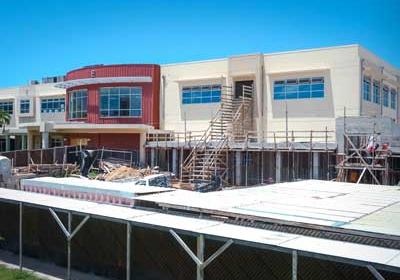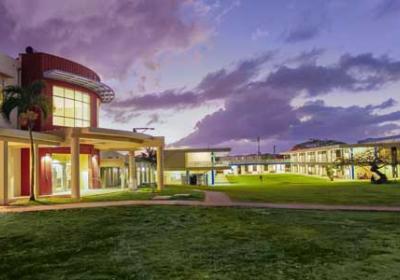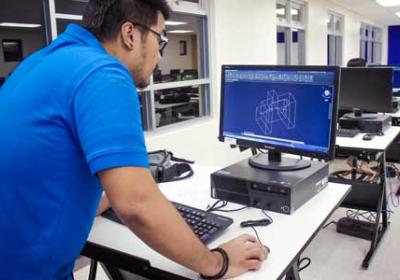Associate of Science in Surveying Technology
- You are on...
Main Page for Surveying Technology A.S.
Associate of Science in Surveying Technology
Total Credit Hours: 62-64
The Surveying Technology program prepares the student for immediate employment as a surveying or Geographic Information Systems (GIS) technician and teaches the student knowledge and skills that will enable one to adapt to ever evolving technical and technological changes in geospatial field and office applications. The graduate will be prepared to face the challenge of modern Surveying and GIS practice. The program emphasizes applications-based approaches and provides an overview of the geospatial fields of surveying, mapping, and GIS and prepares the student for further study and for the Level 3 Certified Survey Technician examination prepared by the American Congress of Surveying and Mapping-National Society of Professional Surveyors (ACSM/NSPS).
Program Student Learning Outcomes (SLOs):
Upon successful completion of the AS in Surveying Technology program, students will be able to:
- Prepare to enter a productive technical position in the geospatial fields of surveying, mapping, and Geographic Information Systems.
- Successfully pass the American Congress of Surveying and Mapping-National Society of Professional Surveyors (ACSM/NSPS) Level 3 Certified Survey Technician examination.
- Emulate a professional work ethic needed in the surveying industry.
- Utilize modern measurement technologies to acquire spatial data and employ industry-standard software to solve technical problems.
General Education Requirements | ||
Course | Course Name | Credits |
EN110 OR EN110A | Freshman Composition OR Freshman Composition with Instructional Lab | 3-4 |
MA161A | College Algebra & Trigonometry I | 3 |
SI110/110L | Environmental Biology: Theory & Environmental Biology Laboratory | 4 |
CS151 | Windows Applications | 3 |
Social & Behavioral Science Requirement (Choose 1) | ||
CJ100 | Introduction to Criminal Justice | 3 |
EC110 | Principles of Economics | 3 |
PS140 | American Government | 3 |
PY100 | Personal Adjustment | 3 |
PY120 | General Psychology | 3 |
PY125 | Interpersonal Relations | 3 |
SO130 | Introduction to Sociology | 3 |
WG101 | Introduction to Women and Gender Studies | 3 |
Humanities & Fine Arts Requirement (Choose 1) | ||
ASL100 | American Sign Language I | 4 |
CH110 | CHamoru I | 4 |
CO125 | Introduction to Human Communication and Speech | 3 |
ED265 | Culture and Education in Guam | 3 |
EN210 | Introduction to Literature | 3 |
HI121 | History of World Civilization I | 3 |
HI122 | History of World Civilization II | 3 |
HI176 | Guam History | 3 |
HM110 | Introduction to Community Services | 3 |
HM201 | Social Welfare & Development: Global Challenges | 3 |
HU120 | Pacific Cultures | 3 |
HU220 | Guam Cultures and Legends | 3 |
JA110 | Japanese I | 4 |
KE110 | Korean I | 4 |
PI101 | Introduction to Philosophy | 3 |
TH101 | Introduction to Theatre | 3 |
VC101 | Introduction to Visual Communications | 3 |
TOTAL | 19-21 | |
Major Requirements | ||
Course | Course Name | Credits |
CT100 OR SU100 | Introduction to Construction Trades OR Surveying Drafting | 3 |
AE103 | Basic Blueprint Reading | 3 |
AE121 | Technical Engineering Drawing I | 3 |
AE150 | Computer Aided Drafting I (CAD I) | 3 |
CE211 | Plane Surveying I | 3 |
CE222 | Plane Surveying II | 3 |
MA161B | College Algebra & Trigonometry II | 3 |
SU101 | Surveying Problems | 3 |
SU230 | Advanced Surveying | 3 |
SU240 | Boundary Law I | 3 |
SU241 | Boundary Law II | 3 |
SU250 | Introduction to Geographic Information Systems | 3 |
SU251 | Advanced Geographic Information Systems | 3 |
SU280 | Special Topics in Geographic Information Systems | 3 |
SU292 | Surveying Practicum | 1 |
Total | 43 | |
PROGRAM TOTAL | 62-64 | |
Course Sequence by Semester
Year 1 | |||||
Semester 1 | Semester 2 | ||||
Course # | Course Name | Credits | Course # | Course Name | Credits |
SU101 | Surveying Problems I | 3 | AE121 | Technical Engineering Drawing I | 3 |
MA161A | College Algebra & Trigonometry I | 3 | AE150 | Computer Aided Drafting I (CAD I) | 3 |
AE103 | Basic Blueprint Reading | 3 | MA161B | College Algebra & Trigonometry II | 3 |
CT100 OR SU100 | Introduction to Construction Trades OR Surveying Drafting | 3 | EN___ | English Requirement | 3-4 |
CS151 | Windows Applications | 3 | SI110/SI110L | Environmental Biology: Theory/ Environmental Biology Laboratory | 4 |
Total | 15 | Total | 16-17 | ||
Year 2 | |||||
Semester 3 | Semester 4 | ||||
Course # | Course Name | Credits | Course # | Course Name | Credits |
CE211 | Plane Surveying I | 3 | SU230 | Advanced Surveying | 3 |
SU240 | Boundary Law I | 3 | SU251 | Advanced Geographic Information Systems | 3 |
SU250 | Introduction to Geographic Information Systems | 3 | CE222 | Plane Surveying II | 3 |
| Humanities & Fine Arts | 3-4 | SU241 | Boundary Law II | 3 |
| Social & Behavioral Sciences | 3 | SU280 | Special Topics in Geographic Information Systems | 3 |
|
| SU292 | Surveying Practicum | 1 | |
Total | 15-16 | Total | 16 | ||
PROGRAM TOTAL | 62-64 | ||||
| General Education Requirements | ||
| Course | Course Name | Credits |
| English (Choose 1) | ||
| EN110A | Freshman Composition with Instructional Lab | 4 |
| EN110 | Freshman Composition | 3 |
| Course | Course Name | Credits |
| MA161A | College Algebra & Trigonometry I | 3 |
| CS151 | Windows Applications | 3 |
| Humanities & Fine Arts | 3-4 | |
| SI110/110L | Environmental Biology & Environmental Biology Laboratory | 4 |
| Social & Behavorial Sciences | 3 | |
| Major Requirements | ||
| Course | Course Name | Credits |
| AE103 | Basic Blueprint Reading | 3 |
| AE121 | Technical Engineering Drawing I | 3 |
| AE150 | Computer Aided Drafting I (CAD I) | 3 |
| CE211 | Plane Surveying I | 3 |
| CE222 | Plane Surveying II | 3 |
| MA161B | College Algebra & Trigonometry II | 3 |
| SU100 OR CT100 | Surveying Drafting OR Introduction to Construction Trades | 3 OR 3 |
| SU101 | Surveying Problems I | 3 |
| SU230 | Advanced Surveying | 3 |
| SU240 | Boundary Law I | 3 |
| SU241 | Boundary law II | 3 |
| SU250 | Introduction to Geographic Information Systems | 3 |
| SU251 | Advanced Geographic Information Systems | 3 |
| SU280 | Special Topics in Geographic Information Systems | 3 |
| SU292 | Surveying Practicum | 1 |
| Program Total | 62-64 | |
2023-2024 College Catalog
Recognizing the necessity for students to succeed in the complex and rapidly changing workplace, Guam Community College offers a general education curriculum that introduces students to major areas of knowledge and methods of inquiry. All degree programs require an interdisciplinary general education component that promotes the development of intellectual skills that enable students to become effective learners and informed citizens. Critical thinking, the use of language and computation, appropriate social skills, global awareness and respect for diverse opinions are among the learning outcomes provided in the general education requirements of each program.
Guam Community College believes that general education provides the academic foundation necessary for students to achieve their life goals. General education is intended to offer students a breadth of quality student learning experiences, encourage their respect for cultural heritage, promote their ethical and responsible social behavior and facilitate their life-long learning.
The General Education program strives to foster student learning and skill development in civic engagement, critical thinking, understanding of the relationship between the individual and society, information literacy, oral communication, quantitative reasoning, and written communication.
Guam Community College believes that high quality general education opportunities for all citizens are necessary for democratic principles and practices to exist and for a sound economy to flourish. The College continually scrutinizes the general education curriculum in order to assure that all degrees and certificates granted by the College support this vision of general education and that it serves as a means to inspire hope, opportunity and responsibility in all its constituencies.
Requirements for General Education follow the options described below. Students declared prior to fall 2010 will follow the requirements indicated in the applicable catalog in which they first declared their major program at the College.
Notes on General Education requirements
Students are advised to check the requirements for their specific programs before taking General Education courses.
Courses chosen to meet the general education requirements may not be used to meet the Major Requirements of a student’s specific degree program.
The list contains courses with pre-requisites, so students should make their choices carefully and thoughtfully. Students may consult a counselor or an academic advisor for guidance in choosing any of the course options listed.
IMPORTANT NOTE: Some programs require different levels of coursework to meet General Education requirements, please review the individual programs for more information.
| GENERAL EDUCATION | ||
| Scope 1: Skills for and Application of Lifelong Learning | ||
| Freshman Composition (Choose one course from the following to meet the required 3-4 credits) | ||
| Course # | Course Name | Credits |
| EN 110 | Freshman Composition | 3 |
| EN110A | Freshman Composition with Instructional Lab | 4 |
| EN 111 | Writing for Research | 3 |
| Mathematics (Choose one course from the following to meet the required 3-4 credits)* | ||
| Course # | Course Name | Credits |
| MA 110A | Finite Mathematics | 3 |
| MA 115 | Fundamentals of College Algebra | 3 |
| MA 161A | College Algebra & Trigonometry I | 3 |
| *Any college level math will be considered for the completion of this category | ||
| Literacy for Life Skills (Choose one course from the following to meet the required 3 credits) | ||
| Course # | Course Name | Credits |
| CO 110 | Critical Thinking for Civic Engagement | 3 |
| CS 151 | Windows Applications | |
| CS 152 | Macintosh Applications | |
| Scope 2: Broad Comprehension of the Development of Knowledge, Practice and Interpretation | ||
| Humanities & Fine Arts (Choose one course from the following to meet the required 3-4 credits)* | ||
| Course # | Course Name | Credits |
| ASL 100 | American Sign Language I | 4 |
| CH 110 | Chamorro I | 4 |
| ED 265 | Culture & Education in Guam | 3 |
| CO 125 | Introduction to Human Communication and Speech | 3 |
| EN 210 | Introduction to Literature | 3 |
| HI 121 | World Civilization (Pre-historic Time to 1500) | 3 |
| HI 122 | World Civilization (1500 to Present Time) | 3 |
| HI 176 | Guam History | 3 |
| HM 110 | Introduction to Community Services | 3 |
| HM 201 | Social Welfare & Development | 3 |
| HU 120 | Pacific Cultures | 3 |
| HU 220 | Guam Cultures & Legends | 3 |
| JA 110 | Japanese I | 4 |
| KE 110 | Korean I | 4 |
| PI 101 | Introduction to Philosophy | 3 |
| TH 101 | Introduction to the Theater | 3 |
| VC 101 | Introduction to Visual Communications | 3 |
| *Any foreign language, humanities, or fine arts course will be considered for the completion of this category | ||
| Natural & Physical Sciences (Choose one course and the corresponding lab from the following to meet the required 4 credits)** | ||
| Course # | Course Name | Credits |
| SI 101/101L | Introduction to Chemistry (3) & Introduction to Chemistry Laboratory (1) | 4 |
| SI 103/103L | Introduction to Marine Biology (3) & Introduction to Marine Biology Laboratory (1) | |
| SI 105/105L | Introduction to Physical Geology (3) & Introduction to Physical Geology Laboratory (1) | |
| SI 110/110L | Environmental Biology (3) & Environmental Biology Laboratory (1) | |
| SI 141 | Applied Physics I | |
| SI 150/150L | Introduction to Microbiology (3) & Introduction to Microbiology Laboratory (1) | |
| SI131/131L | Human Anatomy & Physiology I (3) & Human Anatomy & Physiology I Laboratory (1) | |
| SI132/132L | Human Anatomy & Physiology II (3) & Human Anatomy & Physiology II Laboratory (1) | |
| **The exception to this would be SI141 which does not include a laboratory requirement | ||
| Scope 3: Preparation for and Acceptance of Responsible Participation in Civil Society | ||
| Social & Behavioral Sciences (Choose one course from the following to meet the required 3 credits) | ||
| Course # | Course Name | Credits |
| EC 110 | Principles of Economics | 3 |
| PS140 | American Government | 3 |
| PY 100 | Personal Adjustment | 3 |
| PY 120 | General Psychology | 3 |
| PY 125 | Interpersonal Relations | 3 |
| SO 130 | Introduction to Sociology | 3 |
| CJ 100 | Introduction to Criminal Justice | 3 |
| WG 101 | Introduction to Women and Gender Studies | 3 |
| *Any social and behavioral science course will be considered for the completion of this category | ||
| Minimum General Education Requirements | 19 | |
2023-2024 College Catalog
This suggested sequence of courses is based on the 2023-2024 College Catalog.
| Year 1 | |||||
| Semester 1 | Semester 2 | ||||
| Course | Course Name | Credits | Course | Course Name | Credits |
| AE103 | Basic Blueprint Reading | 3 | AE121 | Technical Engineering Drawing I | 3 |
| CS151 | Windows Application | 3 | AE150 | Comp Aided Design & Draft I | 3 |
| MA161A | College Algebra & Trigonometry I | 3 | EN____ | English Requirement | 3-4 |
| CT100 OR SU100 | Introduction to Construction Trades OR Surveying Drafting | 3 OR 3 | MA161B | College Algebra & Trigonometry II | 3 |
| SU101 | Surveying Problems I | 3 | SI110/SI110L | Environmental Biology AND Environmental Biology Laboratory | 4 |
| Total | 15 | Total | 16-17 | ||
| Year 2 | |||||
| Semester 3 | Semester 4 | ||||
| Course | Course Name | Credits | Course | Course Name | Credits |
| CE211 | Plane Surveying I | 3 | SU230 | Advanced Surveying | 3 |
| SU240 | Boundary Law I | 3 | SU251 | Advanced Geographic Information Systems | 3 |
| SU250 | Introduction to Geographic Information Systems | 3 | CE222 | Plane Surveying II | 3 |
| Humanities & Fine Arts | 3-4 | SU241 | Boundary Law II | 3 | |
| Social and Behavioral Sciences | 3 | SU280 | Special Topics in Geographic Information Systems | 3 | |
| SU292 | Surveying Practicum | 1 | |||
| Total | 15-16 | Total | 16 | ||
| Program Total | 62-64 | ||||
2023-2024 College Catalog
Upon successful completion of the AS in Surveying Technology program, students will be able to:
Prepare to enter a productive technical position in the geospatial fields of surveying, mapping, and Geographic Information Systems.
Successfully pass the American Congress of Surveying and Mapping-National Society of Professional Surveyors (ACSM/NSPS) Level 3 Certified Survey Technician examination.
Emulate a professional work ethic needed in the surveying industry.
Utilize modern measurement technologies to acquire spatial data and employ industry-standard software to solve technical problems.
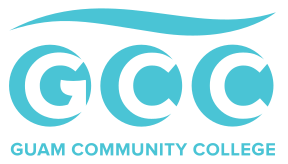

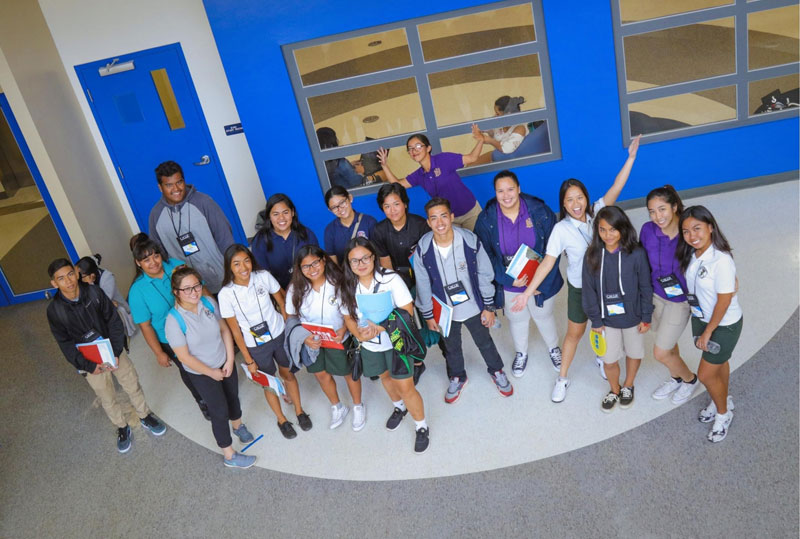
![[title]](https://guamcc.edu/sites/default/files/styles/program_slider/public/constuction-technology.jpg?itok=CnbIEolm)
